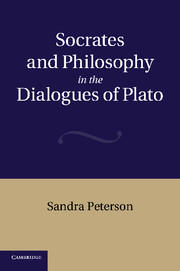Book contents
- Frontmatter
- Contents
- Acknowledgments
- Abbreviations
- Preface
- Chapter 1 Opposed hypotheses about Plato's dialogues
- Chapter 2 Socrates in the Apology
- Chapter 3 Socrates in the digression of the Theaetetus:
- Chapter 4 Socrates in the Republic, part i: speech and counter-speech
- Chapter 5 Socrates in the Republic, part ii: philosophers, forms, Glaucon, and Adeimantus
- Chapter 6 Socrates in the Phaedo: another persuasion assignment
- Chapter 7 Others' conceptions of philosophy in the Euthydemus, Lovers, and Sophist
- Chapter 8 Socrates and Plato in Plato's dialogues
- Chapter 9 Socrates and philosophy
- Bibliography
- Index of passages cited
- General index
Chapter 5 - Socrates in the Republic, part ii: philosophers, forms, Glaucon, and Adeimantus
Published online by Cambridge University Press: 03 May 2011
- Frontmatter
- Contents
- Acknowledgments
- Abbreviations
- Preface
- Chapter 1 Opposed hypotheses about Plato's dialogues
- Chapter 2 Socrates in the Apology
- Chapter 3 Socrates in the digression of the Theaetetus:
- Chapter 4 Socrates in the Republic, part i: speech and counter-speech
- Chapter 5 Socrates in the Republic, part ii: philosophers, forms, Glaucon, and Adeimantus
- Chapter 6 Socrates in the Phaedo: another persuasion assignment
- Chapter 7 Others' conceptions of philosophy in the Euthydemus, Lovers, and Sophist
- Chapter 8 Socrates and Plato in Plato's dialogues
- Chapter 9 Socrates and philosophy
- Bibliography
- Index of passages cited
- General index
Summary
WHEN CAN WE SAY THAT SOCRATES DOES NOT BELIEVE PROPOSALS HE MAKES IN BOOKS 2–10?
I have argued that the brothers' assent to Socrates' proposals in the Republic commits them to those proposals. Socrates, as persuasive speech-maker, so far commits himself to nothing that he says in his speech. His not committing himself, however, does not imply that he rejects any of the novel proposals to which he gets the brothers' assent. Only his explicit examination and his discovery of absurdity would imply that Socrates as depicted rejects what led to absurdity. And in Republic 2–10 he does not examine.
In the absence of Socrates' examination we readers may of course ourselves examine Socrates' proposals. We may after reflection reach the strong judgment that the lives of most of the people in the city constructed in imagination are not worth living: the philosophical ruling class is required to spend much of its life on military planning for this state that maintains its ill-gotten territory to meet excess desires of the manufacturing class that the military class fights for; all three classes have their lives largely organized around the maintenance of the shallow goal of the militarily efficient city that Glaucon set when he restricted discussion to the luxurious city; the arts are censored severely; the reproductive and childrearing arrangements seem inhuman; many of the citizens are, like slaves, unable to choose their ways of life (590).
In short, upon examination we may find Prettycity in many ways quite unacceptable.
- Type
- Chapter
- Information
- Socrates and Philosophy in the Dialogues of Plato , pp. 120 - 165Publisher: Cambridge University PressPrint publication year: 2011



